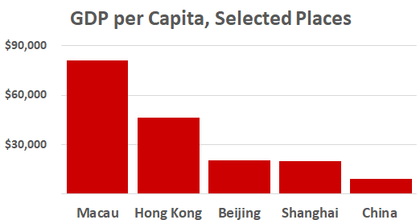Beijing and Revenge on Hong Kong: Financial Times
Hong Kong’s status as a vibrant financial center, a base for companies of all types, flourished under democracy. Democracy and fears about erosion of freedoms also fuels protests. Hong Kong, as a special administrative region of China, operates with a separate set of political processes, since 1997 through 2047. Increasing Chinese influence over Hong Kong, including expulsion of specific elected legislators and tightening controls over the media. So far, China has held back from direct intervention in the protests. Jamil Anderlini, writing for the Financial Times, warns that China will not back down from blocking moves toward democracy. “The protesters, steeped in Chinese history, are well aware of this impending retribution,” he writes. “It has given their movement a hard, nihilistic edge.” Western powers will hesitate to support a city of 7 million against neighboring China, the world’s second largest military and economic power with 1 billion people. Anderlini anticipates censorship at all levels, mass arrests, harsh punishments, mandatory reeducation and speedy introduction of emigrants from the mainland for forced integration. As an authoritarian state, China will set an example with Hong Kong to prevent unrest from spreading. – YaleGlobal
Beijing and Revenge on Hong Kong: Financial Times
Hong Kong, Asia’s most cosmopolitan city and banking center, braces for retribution from China and may never be the same again
Monday, October 7, 2019
Read the article from the Financial Times about China’s reaction to protests in Hong Kong.
Jamil Anderlini is Asia editor for the Financial Times.

(Sources: World Bank and Caixin)
Financial Times
Copyright The Financial Times Limited 2019. All rights reserved.